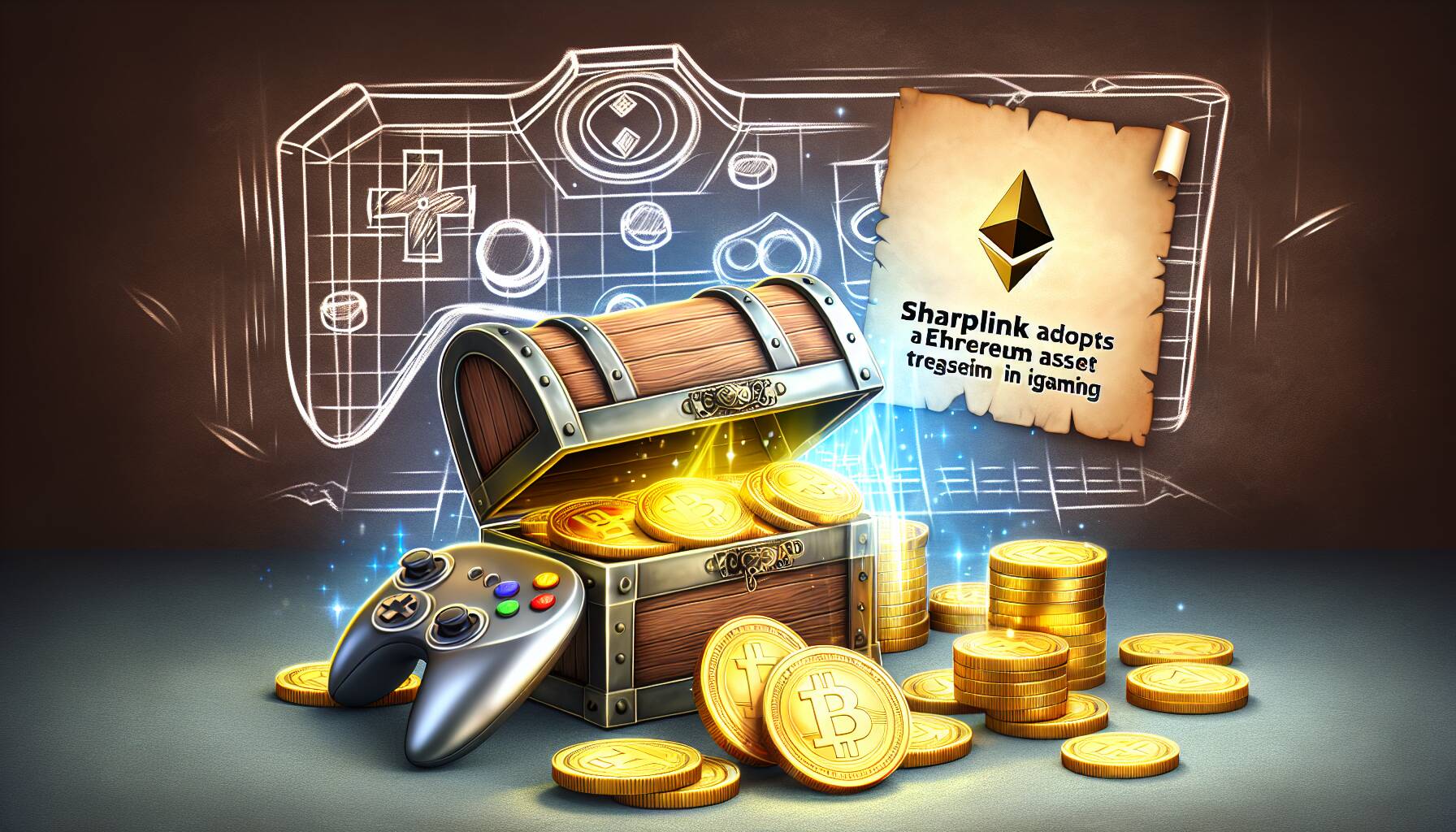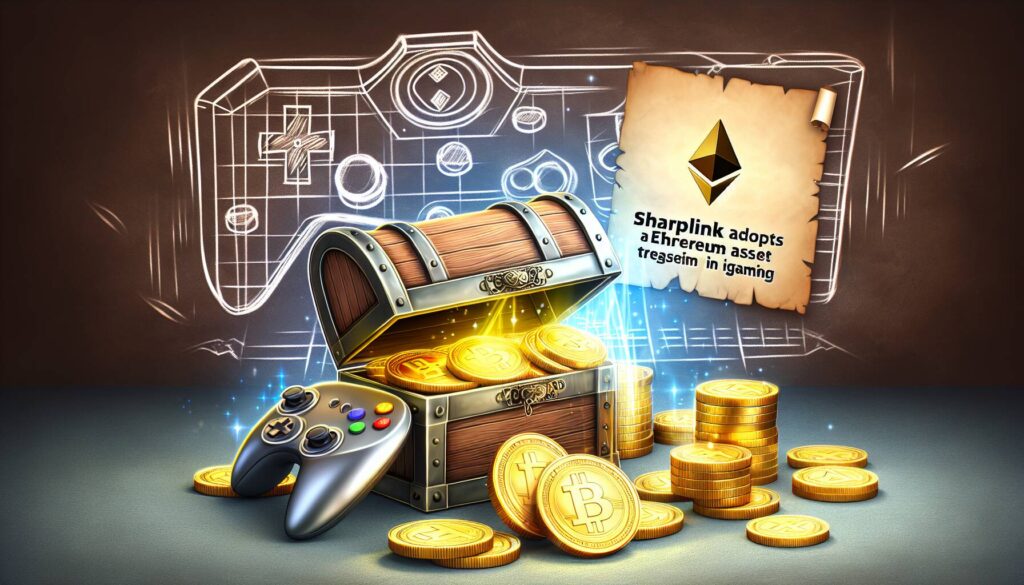As of now, Ether (ETH) is experiencing a modest uptick, trading at approximately $2,505, marking a 0.56% increase over the past 24 hours. This reflects overall positive momentum in the broader cryptocurrency market, represented by the CoinDesk 20 Index (CD20), which has risen by 0.34% during the same timeframe.
In a significant development within the intersection of cryptocurrency and corporate finance, SharpLink Gaming, Inc., an innovative player in the sports betting and iGaming industries, has made headlines with its bold decision to adopt ETH as its primary treasury reserve asset. This groundbreaking announcement, made on July 4, 2025, positions SharpLink as the first publicly listed company to embrace Ethereum in such a strategic manner.
“This comprehensive treasury strategy not only focuses on accumulating ETH but also emphasizes active deployment through staking and yield strategies, aiming to enhance long-term shareholder value,” the company stated.
SharpLink’s treasury strategy kicked off with a substantial $425 million private placement aimed at funding its ETH acquisition, with support from notable crypto figures, including Joseph Lubin, co-founder of Ethereum and founder of Consensys, who joined SharpLink’s Board of Directors as Chairman. Following this, the company has rapidly expanded its Ethereum reserves, reaching nearly 200,000 ETH, all of which are actively engaged in generating staking rewards.
CEO Rob Phythian emphasized that SharpLink’s forthcoming ceremony at the Nasdaq on July 7, 2025, will signify a pivotal moment, showcasing how digital assets can effectively align with established public market practices. This strategic pivot highlights the potential for integrating decentralized finance principles into mainstream corporate treasury management.
As Ether continues to stabilize and present a diversified investment model within this evolving landscape, SharpLink’s initiative underscores the growing synergy between blockchain technology and traditional sectors, particularly in the lucrative realm of sports betting. With this innovative approach, the company is not only redefining treasury management but also paving the way for a future where digital assets like Ethereum coalesce with conventional corporate governance frameworks.

Impact of SharpLink’s ETH Treasury Strategy on the Crypto Market
Key points regarding SharpLink Gaming’s adoption of Ethereum as a treasury asset and its implications for the broader market:
- Current Ether Trading Status: Ether (ETH) is trading at approximately $2,505, showing a modest increase of 0.56% over the last 24 hours.
- SharpLink’s Market Position: SharpLink Gaming, Inc. is a leader in the online sports betting and iGaming markets, leveraging AI for better marketing strategies.
- Pioneering Treasury Strategy: SharpLink announced it has adopted ETH as its primary treasury reserve asset, emphasizing a proactive approach to asset management.
- ETH Accumulation: As of July 1, 2025, SharpLink has amassed 198,478 ETH, with 100% staked to generate rewards, illustrating a commitment to maximizing returns on its holdings.
- Integration of DeFi Principles: The company’s strategy merges traditional finance with decentralized finance (DeFi), potentially influencing how corporations manage treasury assets in the future.
- Strategic Backing: The involvement of notable figures like Joseph Lubin reinforces confidence in the innovative approach, suggesting that this could set precedents for other companies.
- Market Response: As organizations embrace digital assets, the market may see increased investment and regulatory interest in cryptocurrencies, impacting portfolio strategies for individual investors.
- Broader Financial Impact: SharpLink’s actions contribute to the legitimacy and acceptance of cryptocurrencies in mainstream finance, possibly altering investor perception and behavior toward digital assets.
Joseph Lubin emphasized the importance of embedding Ethereum into capital strategies, indicating a shift towards innovative financial solutions that align with future internet infrastructure.
SharpLink Gaming’s Strategic Ethereum Adoption: A Game Changer in iGaming
SharpLink Gaming, Inc. is making headlines with its groundbreaking decision to adopt Ether (ETH) as its primary treasury reserve asset. This bold move sets it apart in a rapidly evolving market, where traditional financial strategies are often at odds with the innovative principles of decentralized finance (DeFi). By leveraging ETH, which is currently witnessing a modest uptick, SharpLink not only aligns itself with the burgeoning crypto landscape but also redefines conventional treasury management approaches.
Unlike many companies navigating today’s landscape of sports betting and iGaming, SharpLink’s integration of ETH into its corporate strategy demonstrates a pioneering mindset. This unique position could serve as a competitive advantage, particularly given the increasing legitimacy and acceptance of cryptocurrencies among institutional investors. Moreover, their strategic partnership with notable figures like Joseph Lubin, co-founder of Ethereum, strengthens their credibility and trust within the sector, showcasing a commitment to blockchain innovation.
However, this strategy may not be without its pitfalls. The volatility associated with cryptocurrencies, including potential price fluctuations of ETH—which recently demonstrated an upward trend from $2,475 to over $2,550—carries inherent risks for corporate treasuries. Such unpredictability could pose challenges for SharpLink, particularly if ETH’s price were to drop significantly, potentially impacting liquidity and operational funding for the company.
This trailblazing approach may greatly benefit investors looking for exposure to the burgeoning intersection of blockchain technology and the iGaming industry. As consumers become more familiar with digital assets, SharpLink might find itself well-positioned to attract a new wave of tech-savvy gamblers and investors seeking transparency and innovative offerings. Conversely, companies that remain entrenched in traditional financial practices might face difficulties keeping pace, potentially leading to a widening gap in market share and relevance amidst evolving consumer preferences.
Furthermore, competitors in both the sports betting and tech sectors could either feel pressured to adapt or risk being left behind. Those that embrace similar strategies may find themselves in a race to establish credibility and capture investor interest, while others might struggle to reconcile their operations with emerging financial paradigms. This shift showcases how the convergence of finance and technology can redefine industry standards and investor expectations going forward.

















